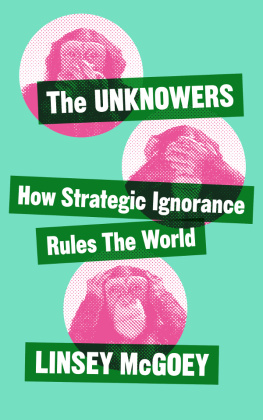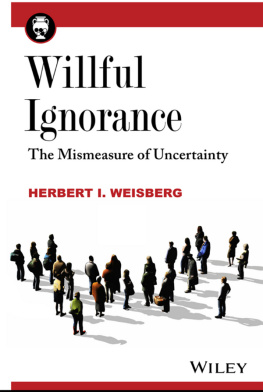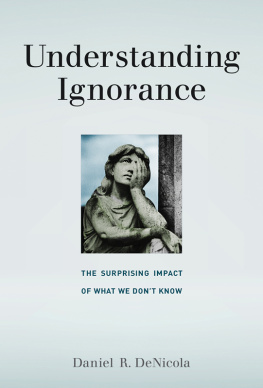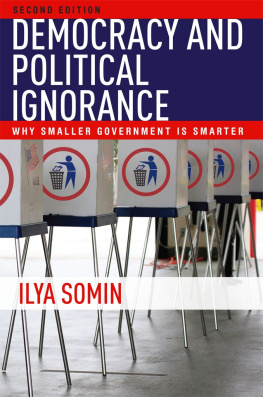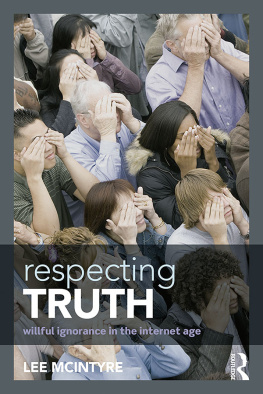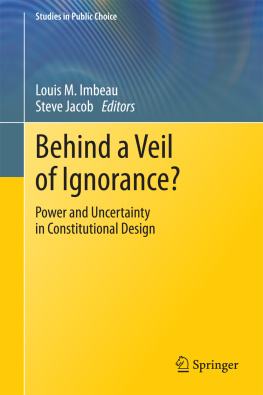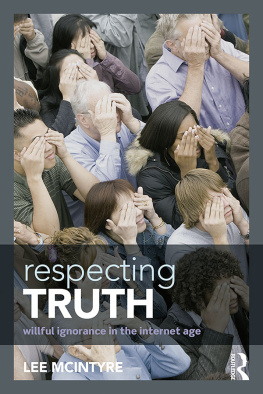
Linsey McGoey has written the definitive book for our times on what makes strategic ignorance so strategic in the hands of the powerful. She persuasively argues that for the most part we already understand the processes, mechanisms and even the agents who are responsible for the injustices that we witness on a daily basis. However, there always remain uncertainties about certain specific issues, and it is here that the powerful deploy strategic ignorance by amplifying those uncertainties so as to render themselves effectively unaccountable. If the truth can set us free, then it is only once we have taken back ignorance.
Steve Fuller, University of Warwick, author of Post-Truth: Knowledge as a Power Game
Ours is an era where truth-telling, leadership and authority have an increasingly feeble relationship. Linsey McGoey knows it all too well as she carefully picks apart how strategic ignorance is a dastardly ploy that enables societys elites to avoid responsibility for their rampant pursuit of self-interest. The news is not good, but it is essential if we are to resist what is one of the most dangerous tendencies of the new normal in global politics.
Carl Rhodes, author of Disturbing Business Ethics, and co-author of CEO Society: The Corporate Takeover of Everyday Life
ABOUT THE AUTHOR
Linsey McGoey is a writer and sociologist based in the United Kingdom. She has written for The Guardian , The Times , The Spectator , Jacobin and Fortune , is the author of No Such Thing as a Free Gift ( 2015 ) and a co-editor of The Routledge Handbook of Ignorance Studies ( 2015 ). She is an associate professor of sociology and Director of the Centre for Research in Economic Sociology and Innovation at the University of Essex.
The
Unknowers
HOW STRATEGIC
IGNORANCE RULES
THE WORLD
Linsey McGoey

The Unknowers: How Strategic Ignorance Rules the World was first published in 2019 by Zed Books Ltd, The Foundry, Oval Way, London SE RR, UK.
www.zedbooks.net
Copyright Linsey McGoey 2019
The right of Linsey McGoey to be identified as the author of this work has been asserted by her in accordance with the Copyright, Designs and Patents Act, 1988 .
Typeset in Avenir and Haarlemmer by Swales & Willis Ltd, Exeter, Devon
Index by Rohan Bolton
Cover design by Andy Allen
All rights reserved. No part of this publication may be reproduced, stored in a retrieval system or transmitted in any form or by any means, electronic, mechanical, photocopying or otherwise, without the prior permission of Zed Books Ltd.
A catalogue record for this book is available from the British Library
ISBN -- 78032 -- hb
ISBN -- 78032 -- pb
ISBN -- 78032 -- pdf
ISBN -- 78032 -- epub
ISBN -- 78032 -- mobi
In memory of my brother Drew McGoey
He who knows only his own side of the case, knows little of that.
John Stuart Mill and Harriet Taylor, On Liberty
CONTENTS
Ive been researching and writing about the topic of strategic ignorance for over years, with many debts accrued.
This book had a long period of development. It is rooted in a PhD thesis, The Value of Ignorance, that I designed and carried out at the London School of Economics from 2004 to 2007 . After LSE, I held research fellowships at the University of Oxford before moving to the Department of Sociology at the University of Essex. In each of these settings, my substantive research focus changed: at LSE, I studied corporate crime and pharmaceutical regulation; later, while working as a researcher at Oxford, I investigated big philanthropy and its unintended social effects. A couple of years later, at Essex, my research shifted to a focus on the history of economic thought in the th and early th centuries.
Although the empirical settings were different, concepts that I had developed in my PhD were relevant to new empirical research areas, including notions such as regulatory anti-strategies and strategic ignorance (a term coined before me, but which I define in a new way).
The Unknowers expands upon these earlier concepts, developing a new theoretical approach for understanding the relationship between knowledge, ignorance and power in the modern age.
The stories and news events described in The Unknowers draw on different research methods, from investigative reporting to qualitative sociological interviewing. It is a book that marries the history of ideas, and particularly late Enlightenment political economic thought, with first-hand reporting on the power and value of ignorance to powerful people and institutions today. This focus draws on different professional qualifications, including my earlier work as a freelance journalist, followed by training at LSE as a sociologist, leading to a current post as Director of the Centre for Research in Economic Sociology and Innovation at Essex.
My doctoral research at the LSE examined the social implications of governmental efforts to ensure that pharmaceutical medicines are safe for use and affordable for different members of the public, and for this research, I carried out interviews with a number of high-profile people who were in the news frequently during the mid- 2000 s, when large pharmaceutical companies including Merck and GlaxoSmithKline were found to have hidden evidence about the harmful effects of some of their bestselling pharmaceutical drugs.
I interviewed many different stakeholders central to the story, including the CEO of the UKs drug regulatory agency, Kent Woods, and David Graham, a heroic whistle-blower and FDA employee commended in the media for disclosing the risks of Mercks bestselling drug Vioxx. Some of the people I interviewed agreed to speak on the record and others did not. Those who agreed to speak on the record, including Woods and Graham, are named in this book, as well as identified in earlier articles of mine published in journals such as The Lancet and The Journal of Medical Ethics . Im grateful to the many physicians, regulators and lawyers who took the time to speak with me during interviews that took place over the mid to late 2000 s, as well as to more recent interviewees, acknowledged in individual chapters, who participated in discussions over the past two years about the legal and social uses of strategic ignorance.
This book therefore draws on and republishes, with permission, some my earlier work, including On the Will to Ignorance in Bureaucracy, Economy and Society ( 2007 ); Pharmaceutical Controversies and the Performative Value of Uncertainty, Science as Culture ( 2009 ); and The Logic of Strategic Ignorance, British Journal of Sociology ( 2012 ).
Other chapters in the book are indebted to the analysis and reportage of journalists who describe events where I was not present. This includes the Grenfell fire and Rupert Murdochs appearance before Parliament. In Chapter , Nick Davies important book Hack Attack was particularly indispensable. Any errors are my own.
A first draft of this book was written during a visiting fellowship at Sciences Po in Paris in 2017 . Thanks to Jenny Andersson, Olivier Godechot and Mark Vail for their collegiality during this fellowship.
Thanks also to Fabian Muniesa and Catherine Grandclment, and to other interlocutors in Europe and elsewhere carrying out important research on ignorance, especially Matthias Gross, who is co-editor with me of the Routledge Handbook of Ignorance Studies , as well as to Michael Smithson, Peter Wehling, Mathias Girel, Nathalie Jas, Nicolas Larchet, Didier Torny, Marc-Olivier Dplaude, Franois Dedieu, Thomas Depecker, Grgoire Mallard, Adriana Mica, Katharina Paul, Christian Haddad, Nora Stel, Stuart Firestein, Stefan Bschen and David Demortain.
Next page
